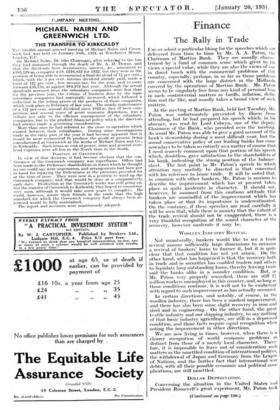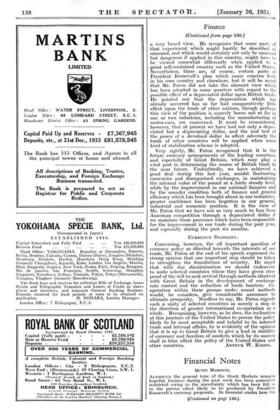Finance
The Rally in Trade
I'MUST admit a particular liking for the speeches which are delivered from time to time by Mr. A. A. Paton, the Chairman of Martins Bank. They are usually charac- terized by a fund of common sense which gives to his views a special value, while they are also the views Of one in direct touch • with the commercial -problems of• this country, especially, perhaps, in so far as those problems are concerned with the large district in the Midlands covered by the Operations of Martins Bank.. Mr. Paton seems to be singularly free from any kind of personal bias in such controversial - matters -as--tariffs, inflation, defla- tion and the like, and usually takes a broad view of slick matters.
At the meeting of Martins Bank, held last Tuesday, Mr. Paton was unfortunately prevented by illness from attending, but he had prepared his speech which, in his absence, was read by Lord Colwyn, one of the deputy Chairmen of the Bank, who presided over the meeting. As usual Mr. Paton was able to give a good account of the bank's stewardship during a most difficult year, but the sound conservative policy of our leading banks has come nowadays to he taken so entirely as a matter of course that I need scarcely comment upon that portion of his speech which, doubtless, gave satisfaction to the shareholders of his bank, indicating the strong position of the balance- sheet. The- first point in Mr. Paton's speech to which attention may usefully be directed is that concerned with his reference to home trade. It will be noted that, in common with other bankers, Mr. Paton is anxious to describe the improVement which has at present taken place. as quitejnoderate in character. It should_ not, however, be assumed from this . cautious attitude that bankers are unmindful of the improvement which has -taken place or that its importance is ' underestimated. On the contrary,. if these speeches are .read_ carefully it will be seen that, while there is anxiety that -the extent of the trade- revival should not be exaggerated, there is a very thankful recognition of the sound character of the recovery, however moderate it may be.- -
WOOLLEN INDUSTRY REVIVAL.
_ Not unnaturally, bankers would like to see- a trade revival assume sufficiently large dimensions to occasion a revival of bankers' loans to finance it, but it is quite clear that that condition has not yet arisen. On the other hand, what has happened is that the recovery both in trade and in securities has enabled traders and others to liquidate long outstanding loans, thereby leaving trade • and the banks alike in a sounder condition. But, as 'Mr. Paton very properly remarked, there are still 2f million workers unemployed in this country, and, so long as those conditions continue, it is well not to be exuberant with regard to such improvement as has actually occurred.
In certain directions, and notably, of course, • in the woollen industry, there has been a marked improvement, and there has also been some slight recovery -in iron and steel and in engineering. On the other hand, the great textile industry and our shipping industry, to say nothing of that basic industry agriculture, are still in a depressed condition', and those factsrequire equal recognition when notini notng the improvement in other directions. We are now living in times, however, when there is a clearer -recognition of -World • economic problems as distinct from thOse of a merely local .eharacter. There- -fore, it is impossible to leave out of -consideration such matters as the unsettled condition of international polities, the withdrawal of Japan and Germany from the League of Nations, and the further fact that international ,'ar debts, with all their possible economic and political CORP plieations, are still unsettled. •
DOLLAR DEPRECIATION.
. Concerning the situation in the United States and President Roosevelt's great experiment, Mr. Paton took (Continued on page 138.)
Finance
(Continued from page -186.) a very broad view. He recognizes that some parts of that experiment which might hastily be described as uftsound; and which would certainly not only be unsound but dangeroui if applied in this country, might have to be viewed somewhat differently when applied to a great self-contained country such as the United States. Nevertheless, there are, of course, certain parts of President Roosevelt's plan which cause concern both in his own country and elsewhere, but it will be noted that Mr. Paton did not take the alarmist view which has, been adopted in some quarters with regard to the possible effect of a depreciated dollar upon British trade. He pointed out that the depreciation which has already occurred has so far had comparatively little effect upon the trade of other nations, though perhaps this view of the position is scarcely borne out so far as one or two industries, including the manufacturing of motor-cars, are concerned. It must be remembered, however, that at present we have had not only a depre- ciated but a depreciating dollar, and the real test of the power of a devalued dollar to affect adversely the trade of other countries will be applied when some kind of stabilization scheme is adopted.
Very rightly, Mr. Paton recognized that it is the future currency arrangements of the leading countries, and especially of Great Britain, which may play a vital part in determining the course of British trade in the near future. Undoubtedly, we have achieved a good deal during this last year, amidst fluctuating currencies and disorganized exchanges, in maintaining the internal value of the pound at a fairly steady level, while by the improvement in our national finances and by the sounder condition both of finance and general efficiency which has been brought about in our industries, greater confidence has been begotten in our general, industrial and economic position. It is the view of Mr. Paton that we have not so very much to fear from American competition through a depreciated dollar if we maintain those processes which have been responsible for the improvement in our trade during the past year, and especially during the past six months.
CURRENCY STABILITY.
Concerning, however, the all important question of currency policy as -directed towards the interests of our trade, Mr. Paton at the end of his speech expressed the strong opinion that one important step should be taken to strengthen the foundations of security. He urged that with due discrimination we should endeavour to unite selected countries where they have given clear proof of the will to seek revival through methods identical with Great Britain in the development of exchange rate control and the reduction of trade barriers. Co- operation within these groups under sound methods would, he considers, give considerable assurance to ultimate prosperity. Needless to say, Mr. Paton regards such a unity of selected countries as merely a step in the direction of greater international co-operation as a whole. Recognizing, however, as he does, the inclination at this juncture of the United States to pursue the policy likely to be most acceptable and helpful to its internal trade and internal affairs, he is evidently of the opinion that it is up to Great Britain to give a lead in stability of currency and freedom of markets which by its success shall in time affect the policy of the United States and











































 Previous page
Previous page